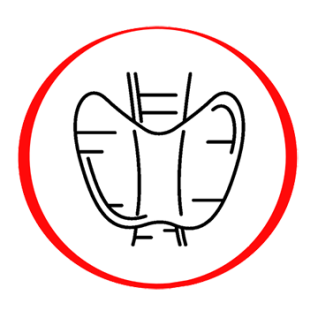Blood take service 5.00€

TTH (TSH) | Thyrotropic hormone
11.00€
The validity period of online orders: 3 months from the purchase date.
Thyroid-stimulating hormone (TSH/TTH) is one of the most important indicators of thyroid function. This hormone is produced by the anterior pituitary gland. TSH/TTH stimulates the secretion of thyroxine (T4) and triiodothyronine (T3) in the body. The concentration of TSH in the blood is usually inversely proportional to the concentration of thyroxine and triiodothyronine (FT4 and FT3). TSH determination is used for the primary diagnosis of thyroid diseases, after surgical removal of the thyroid gland and during treatment with L-thyroxine preparations. In neonates up to 4 days of age, TSH/TTH concentrations are markedly higher than in other age groups. Therefore, all investigations suspicious of congenital thyroid pathology should be performed 4 days after birth. TSH/TTH concentrations gradually increase in old age. The TSH/TTH value reflects the response of the pituitary gland rather than the thyroid gland itself. TSH/TTH increases in primary thyroid hypofunction - myxedema; in subacute thyroiditis (Hashimoto's thyroiditis); in pituitary tumours. It may also increase in association with elevated cholesterol levels and with the use of various medications (lithium preparations, iodine). Decreases in the presence of primary thyroid hyperfunction - thyrotoxicosis, in the presence of pituitary tumours or trauma. Occasionally, the decrease may be caused by pregnancy or medication (thyroxine preparations, glucocorticoids, dopamine).
Increase
- Myxedema, primary hypofunction of the thyroid gland.
- Subacute thyroiditis (Hashimoto's thyroiditis). TSH elevation may be present in the background of normal or slight decrease in FT4, very often in such euthyroid patients an anti-TPO elevation may be found, such indicators may indicate the onset of autoimmune pathology.
- Pituitary tumours.
- Cholesterol elevation.
- Rarely, paraneoplastic syndrome (breast, lung, pituitary tumours).
- Medications (lithium preparations, propylthiouracil, amiodarone, iodine, radiopaque preparations).
- Brain trauma.
- Chronic disease.
- Secondary hypothyroidism (pathology of the pituitary gland or hypothalamus).
Decrease
- Thyrotoxicosis, primary thyroid hyperfunction.
- FT3 thyrotoxicosis (triiodothyronine tyrosis, no increase in FT4).
- Occasionally - pregnancy.
- Pituitary tumours, trauma.
- Severe chronic disease (rarely accompanied by a decrease in FT4).
- Medications (thyroxine preparations, levodopa, glucocorticoids, dopamine/605">dopamine).
- Immunological quantitative in vitro study.
Tested in serum and plasma.
Recommendations:
- Recommended as a prophylactic test 1 time per year.
- For treatment monitoring, perform periodically according to physician's instructions.
- The accuracy of the test response is influenced by the use of medications and radiological tests.
- The test collection requires a fasting period of 8 hours.

Reference: 15126
11.00€








